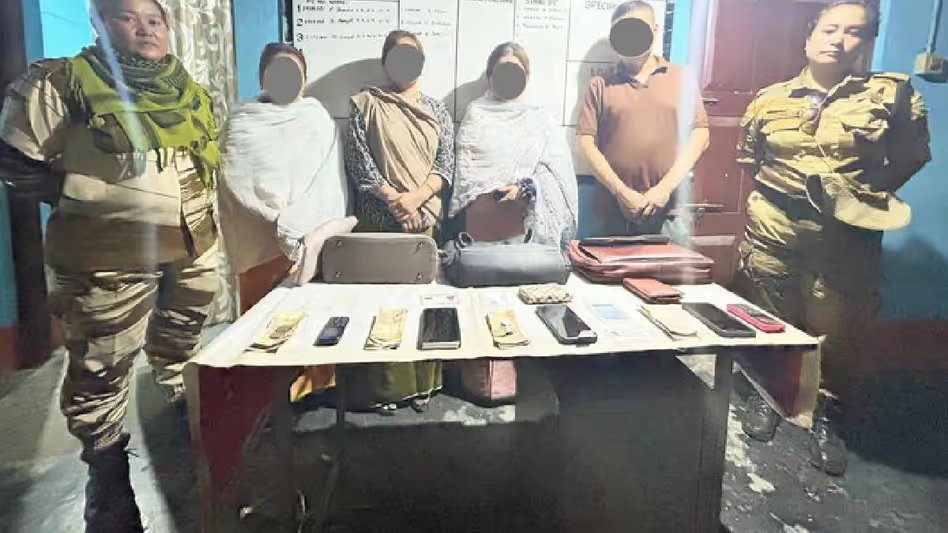Four KCP (Taibanganba) cadres arrested in Manipur’s Thoubal district; mobile phones, Aadhaar cards seized
Short summary (quick news brief)
Security forces arrested four active cadres of the proscribed Kangleipak Communist Party (KCP — Taibanganba faction) from Langthabal Khunou under Khongjom Police Station in Thoubal district, Manipur, on Thursday, August 14. The arrested persons were named as Konjengbam Babita (45), Lisham Premika Devi (33), Nandeibam Noni Devi (53) and Heikham Ravi Meitei (38). Authorities recovered five mobile handsets, Rs 1,666 in cash and two Aadhaar cards during the operation. Further investigation is ongoing to map their movements and networks.
Opening: a small operation, a bigger story
Imagine a quiet village street in Langthabal Khunou — the kind of place where neighbors know one another’s routines and children still play in the evenings. Now imagine that, on a humid August morning, security forces quietly move in and detain four people who are alleged to be active cadres of a banned insurgent group. It hardly sounds cinematic, but these small, targeted operations are the daily bread-and-butter of counter-insurgency work in regions with prolonged low-intensity conflict. What was recovered — five handsets, a small amount of cash and two Aadhaar cards — may look minor on paper, but broken down, each item can be a key to unraveling networks, financing, and movements.
Why should you care? Because incidents like this are not isolated: they are threads in a larger fabric of security responses, local societal impacts, and the ongoing struggle to restore rule of law and normalcy in parts of the Northeast where insurgent groups have historically sought influence.
The facts, plainly stated
- Who was arrested: Four individuals identified as Konjengbam Babita (45), Lisham Premika Devi (33), Nandeibam Noni Devi (53), and Heikham Ravi Meitei (38).
- Where: Langthabal Khunou, under Khongjom Police Station jurisdiction, Thoubal district, Manipur.
- When: The arrests took place on Thursday, August 14. The news was reported on Aug 16, 2025.
- What was seized: Five mobile handsets, cash amounting to Rs 1,666, and two Aadhaar cards.
- What’s next: Further probe to determine recent movements, networks and possible unlawful activities.
Those are the pillars of the incident. But the real value comes from reading between the lines — understanding the context, the mechanics of such operations, and the ripple effects on local communities.
5 FAQs
Q1: Were the arrested individuals formally charged in court?
A1: The news report notes the arrests and seizures; it states further investigation is underway. Court charges and formal filings typically follow once police complete initial probes and file a charge sheet. Keep an eye on local court records or subsequent official police bulletins for updates
Q2: What exactly can investigators extract from the seized mobile phones?
A2: Investigators can extract call logs, SMS history, contact lists, app data, location metadata, and sometimes deleted messages depending on device condition and forensic tools. This data helps map networks and timelines.
Q3: Does seizure of Aadhaar cards mean the identities were false?
A3: Not necessarily. Aadhaar cards could belong to the arrested persons or others; they are often seized to verify identities and to check for possible misuse or cloned records. Forensic checks and cross-referencing with government databases determine authenticity.
Q4: How common are such arrests in Manipur?
A4: Operations targeting cadres of proscribed groups have been fairly regular in recent years, as security forces maintain pressure on various outfits across multiple districts. These arrests form part of continued counter-insurgency efforts.
Q5: What should local residents do if they suspect extortion or militant activity?
A5: Report it to local police or designated helplines, provide any evidence you safely can, and avoid vigilante responses. Community policing initiatives and anonymous tip-lines are effective channels. Cooperation with lawful authorities helps reduce risk and protect communities.

